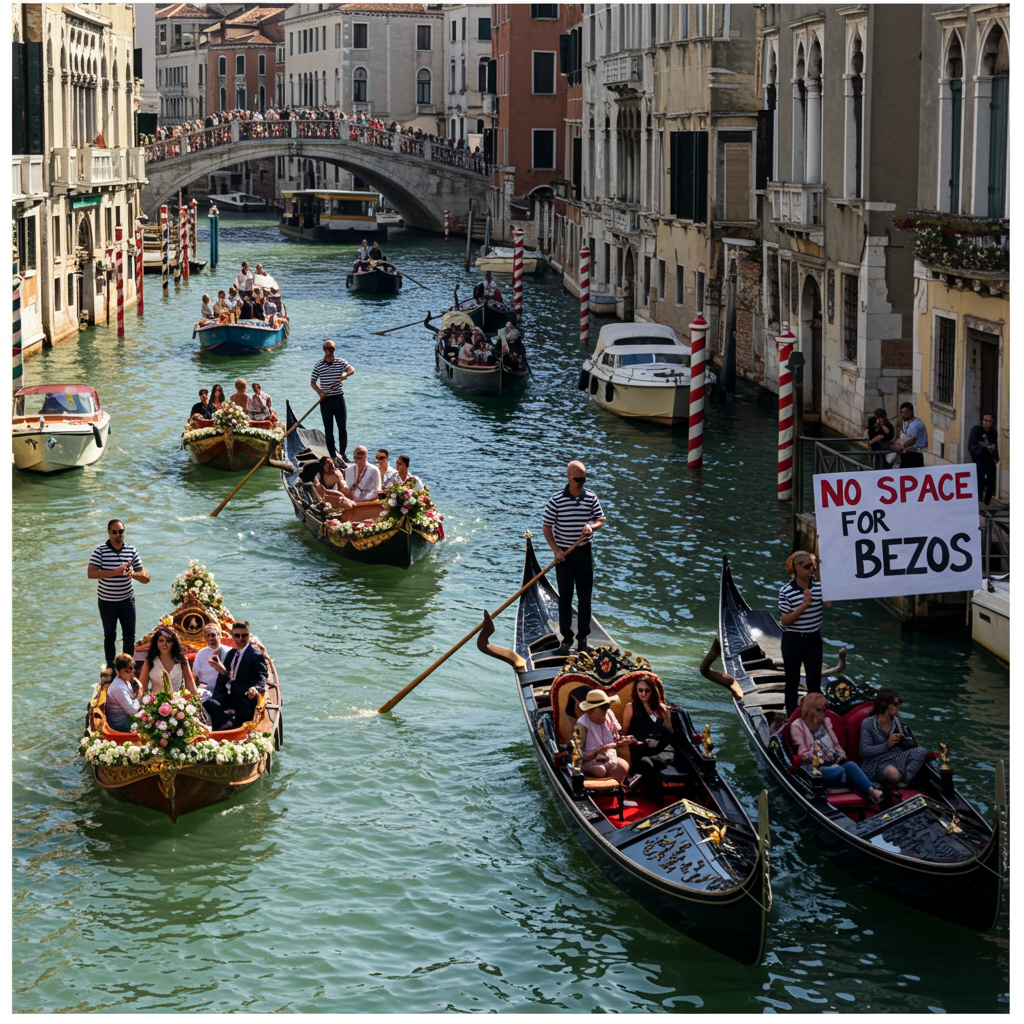Amazon founder Jeff Bezos and fiancée Lauren Sánchez are set to host a lavish wedding celebration in Venice next week, a choice of venue that has ignited fierce protests among some local residents. Already grappling with the immense pressures of mass tourism, these Venetians argue the city has “No space for Bezos” and that such a high-profile, opulent event symbolizes the exploitation of their home.
Venice Residents Protest Lavish Nuptials
Residents have taken to the streets, displaying signs and banners, including one prominently placed on the iconic Rialto Bridge reading “No space for Bezos.” They view the three-day event, expected to host around 200-250 wealthy guests, as a prime example of Venice being treated as a mere “playground for the rich,” prioritizing profit and spectacle over the preservation of its unique cultural heritage and the quality of life for its dwindling local population.
Protest organizer Federica Toninello sharply criticized Venice Mayor Luigi Brugnaro, who initially expressed shame at the protests but later welcomed Bezos, stating that those exploiting and “destroying” the city are the ones who should feel shame. Reports suggest protesters are contemplating disruptive actions during the wedding festivities, potentially including blocking pathways or canals to highlight their frustration.
The Root Cause: Venice’s Overtourism Crisis
This backlash isn’t just about a wedding; it’s deeply rooted in Venice’s ongoing battle with overtourism. The city’s historic center, a tiny two-square-mile area home to roughly 50,000 people, receives a staggering 20 million visitors annually, with the vast majority being day-trippers. This immense volume strains infrastructure, displaces residents unable to afford rising costs, and contributes to environmental and historical damage. UNESCO even added Venice to its list of endangered world heritage sites in 2023, citing these issues.
Venice officials have acknowledged the problem, implementing measures like a daily entrance fee (introduced in 2024, enforced on specific peak days in 2025) to manage visitor flow. However, critics argue such steps are insufficient when the city simultaneously “rolls out the red carpet” for billionaires like Bezos.
The protests in Venice also mirror a broader wave of anti-tourism sentiment spreading across southern Europe, with similar demonstrations recently held in popular destinations like Spain (Mallorca, Barcelona) and Portugal (Lisbon), where residents voice concerns over unsustainable tourism models impacting their lives.
Official Welcome vs. Local Discontent
Despite the local outcry, Venice city officials maintain a welcoming stance. Mayor Brugnaro called it an “honor” to host Bezos, praising his global achievements. City Hall has sought to downplay potential disruptions, stating that the wedding will use only a limited number of water taxis (around 30 out of 280) and a few hotels, and that the event will blend into the city’s normal rhythm. They emphasized that Venice is well-versed in hosting high-profile events, referencing past celebrity weddings (like George Clooney’s), international summits (G7, G20), and traditional festivals as proof of its capacity. Officials also contended that the protests do not represent the majority of citizens who are reportedly proud to host the event.
However, this official narrative clashes with the visible anger of residents who feel events like these exacerbate the feeling that their city is being commodified. While some argue the influx of wealthy guests could boost the local economy, protesters question whether these benefits trickle down to ordinary Venetians or primarily serve the luxury sector and external businesses. Estimates suggest the wedding could cost around $10 million, with reservations potentially made across five luxury hotels.
Venice’s Complex Identity: History vs. Modern Challenges
The debate over the Bezos wedding also brings to the forefront differing views on Venice’s historical identity. While protesters advocate for a city focused on its residents and preservation, others point to Venice’s past as a dynamic hub of international trade and “ruthless capitalists,” built on wealth and attracting foreigners for centuries. From this perspective, hosting grand, international events isn’t a deviation but rather “quintessentially Venetian.”
Some also challenge the narrative that mass tourism is solely responsible for residents leaving and properties lying empty. An alternative viewpoint suggests that the lack of diverse job opportunities outside of tourism and public service, combined with the appeal of larger, more affordable housing in mainland areas, are significant factors driving population decline and reducing demand for housing on the islands, including city council-owned properties. This perspective argues the issue is more complex than simply ‘too many tourists.’
As details of the wedding remain largely private, beyond speculation about a star-studded guest list potentially including figures like Eva Longoria, Katy Perry, and members of the Kardashian family, the planned celebration continues to serve as a flashpoint. The controversy underscores the ongoing tension in Venice between embracing its global stage reputation and preserving the fragile reality of life for its residents amidst the relentless tide of mass tourism.



